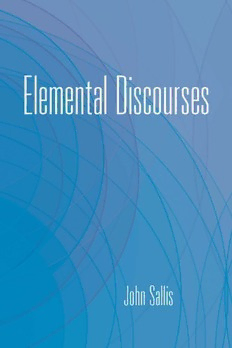
Elemental Discourses PDF
Preview Elemental Discourses
ELEMENTAL DISCOURSES THE COLLECTED WRITINGS OF JOHN SALLIS E l e m e n t a l D i s c o u r s e s THE COLLECTED WRITINGS OF JOHN SALLIS VOLUME II/4 J O H N S A L L I S INDIANA UNIVERSITY PRESS This book is a publication of Indiana University Press Office of Scholarly Publishing Herman B Wells Library 350 1320 East 10th Street Bloomington, Indiana 47405 USA iupress.indiana.edu © 2018 by John Sallis All rights reserved No part of this book may be reproduced or utilized in any form or by any means, electronic or mechanical, including photocopying and recording, or by any information storage and retrieval system, without permission in writing from the publisher. The paper used in this publication meets the minimum requirements of the American National Standard for Information Sciences— Permanence of Paper for Printed Library Materials, ANSI Z39.48–1992. Manufactured in the United States of America Cataloging information is available from the Library of Congress. ISBN 978-0-253-03722-0 (hardback) ISBN 978-0-253-03723-7 (pbk.) ISBN 978-0-253-03724-4 (web PDF) 1 2 3 4 5 23 22 21 20 19 18 CONTENTS 1. VOICES 1 2. GATHERING LANGUAGE 20 3. THE PLAY OF TRANSLATION 37 4. THINGS OF SENSE 52 5. ARCHAIC NATURE 66 6. ALTERITY AND THE ELEMENTAL 84 7. O BJECTIVITY AND THE REACH OF ENCHORIAL SPACE 99 8. THE SCOPE OF VISIBILITY 122 9. COSMIC TIME 138 10. THE NEGATIVITY OF TIME-SPACE 153 AFTERWORD 173 Index of Prinicpal Names 175 ELEMENTAL DISCOURSES 1 VOICES There are perhaps no powers that appear more manifestly and directly reflexive than the voice. The possibility of duplicity—of doubling and even of concealing the doubling—is by no means excluded: one can mi- metically assume the voice of another or even lend one’s voice to another as in ventriloquy. However, when one speaks in one’s own voice, perhaps also attesting even that it is in one’s own voice that one is speaking, then the seemingly direct reflexivity of the voice becomes operative. Then speech displays, precisely in this reflexivity, the character of ownness, and it is no longer openly marked by duplicity in either sense. The reflexivity is perhaps most readily manifest in the word itself. To say the word is to invoke immediately that which the word names. In the very voicing of the word voice, one instantiates what it means or at least attests to the power that it names. In being voiced, in sounding forth from the voice, the word performs what it names. In being uttered, it reflects back upon the utterance in such a way as to affirm their coincidence across the difference between word and deed, λόγος and ἔργον. Yet, reflexivity is also manifest in the very operation of the voice, quite aside from its engagement with the word. In this regard it can be compared to phantasy or even, more obliquely, to imagination. In the respective operations of the voice and of phantasy, production and re- ception are bound together in the most intimate connection. With regard to this structure, both the voice and phantasy can, in turn, be compared to original or intellectual intuition as this concept was pos- ited by Kant. Intuition of this kind is—or would be, if it were—such that “the existence [Dasein] of the object of intuition is given through it
